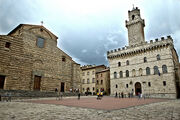No edit summary |
|||
| (4 intermediate revisions by 3 users not shown) | |||
| Line 1: | Line 1: | ||
| − | + | [[File:Montepulciano.jpg|thumb|Montepulciano]] |
|
| − | + | '''Montepulciano '''is a town in Southern Tuscany, Italy. It served as a filming location for the [[Volterra]] scenes in the ''[[New Moon (film)|New Moon]]'' film. |
|
==History== |
==History== |
||
| ⚫ | The name of Montepulciano derives from Latin ''Mons'' and ''Publicianus'' ("Mount of Publicianus"). According to legend, it was founded by the Etruscan King Porsenna of Chiusi; recent findings prove that a settlement was already in existence in the 4th-3rd centuries BC. In Roman times it was the seat of a garrison guarding the main roads of the area. |
||
| ⚫ | After the fall of the Western Roman Empire, it developed as a religious center under the Lombards. In the 12th century it was repeatedly attacked by the Republic of Siena, which the Poliziani faced with the help of the Perugia and Orvieto, and sometimes Florence, communes. The 14th century was characterized by constant struggles between the local noble families, until the Del Pecora family became rulers of the town. From 1390, Montepulciano was a loyal ally (and later possession) of Florence and, until the mid-16th century, lived a period of splendour with architects such as Antonio da Sangallo the Elder, Jacopo Barozzi da Vignola, Baldassarre Peruzzi, Ippolito Scalza and others, building luxurious residences and other edifices here. In 1559, when Siena was conquered by Florence and Montepulciano lost its strategic role, its importance declined. |
||
| ⚫ | |||
| + | |||
| − | |||
| ⚫ | |||
| ⚫ | |||
| − | |||
| ⚫ | |||
[[Category:Locations]] |
[[Category:Locations]] |
||
[[Category:Real world]] |
[[Category:Real world]] |
||
Revision as of 02:39, 10 May 2013

Montepulciano
Montepulciano is a town in Southern Tuscany, Italy. It served as a filming location for the Volterra scenes in the New Moon film.
History
The name of Montepulciano derives from Latin Mons and Publicianus ("Mount of Publicianus"). According to legend, it was founded by the Etruscan King Porsenna of Chiusi; recent findings prove that a settlement was already in existence in the 4th-3rd centuries BC. In Roman times it was the seat of a garrison guarding the main roads of the area.
After the fall of the Western Roman Empire, it developed as a religious center under the Lombards. In the 12th century it was repeatedly attacked by the Republic of Siena, which the Poliziani faced with the help of the Perugia and Orvieto, and sometimes Florence, communes. The 14th century was characterized by constant struggles between the local noble families, until the Del Pecora family became rulers of the town. From 1390, Montepulciano was a loyal ally (and later possession) of Florence and, until the mid-16th century, lived a period of splendour with architects such as Antonio da Sangallo the Elder, Jacopo Barozzi da Vignola, Baldassarre Peruzzi, Ippolito Scalza and others, building luxurious residences and other edifices here. In 1559, when Siena was conquered by Florence and Montepulciano lost its strategic role, its importance declined.
After the unification of Italy and the drying of the Val di Chiana, the town remained the most important agricultural centre in the area, while the industrial activities moved mostly next to Chiusi, which was nearer to the railroad being built in that period.
